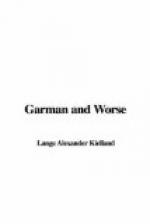Rachel came to meet them on the steps; she went straight up to Uncle Richard and whispered in his ear, “Be calm, uncle; don’t let us spoil Gabriel’s evening. Father has had a stroke. He is in bed, and the doctor is here.”
The attache entered without saying a word, and Rachel threw her arms round her brother’s neck and said, “Who would have thought of your being such a clever boy, Gabriel?”
“Boy!” said Gabriel.
“Or man, I shall have to say in future,” answered Rachel, with a smile. “But what have you done with your workmen?”
They were not far behind; and Rachel distributed among them beer, wine, sausages, bacon, white bread, and other delicacies, until Gabriel remarked, “You are much more liberal than Miss Cordsen; but had you not got some chickens for the ball?”
Yes, indeed! She had forgotten the ball. Rachel’s feelings were so pained by seeing Gabriel in such high spirits, that she could not contain them any longer, so she said quietly, “Gabriel, there will be no ball to-morrow. Father is ill.”
Gabriel had not to ask why. He saw it was something serious. The workmen were standing by the steps, laden with the good things, and uncertain where they should take them.
“Come, let us go back to the ship-yard,” said Gabriel; “we shall be all to ourselves there, and besides, it will be nice and warm.”
Rachel could hear from his voice that there were tears in his eyes, and the thought occurred to her, how he had grown from a boy to a man in the last few hours.
The storehouse had now fallen in, and the ruins were still burning on the ground. The yard, thanks to Mr. Robson, had been so well cleared, that the watchmen had but little difficulty in keeping the fire isolated. After midnight the wind lulled, and the thick clouds of smoke soared up into the air, and were driven slowly over the fjord.
As the ship took the water, she drove across the wind a little way from the shore, and fouled an old brig belonging to the firm; and for the rest of the night was heard the shouting and singing of the numerous volunteers, who were hard at work clearing the vessels, and mooring the newly launched one.
The shipwrights sat comfortably in the yard, just near enough to the fire to feel its warmth. They had got far more than they could fairly take on board, and, every now and then, they treated one of the watchmen to something as he passed.
The only flaw in their pleasure was that Gabriel could not be with them. He had been obliged to tell them that the Consul was ill, and that he must, therefore, remain in the house. No one thought of accusing Gabriel of pride, and they all drank his health, and as many other healths as they could find an excuse for, in bumpers of the wine to which they were so little accustomed. Of the food which had been given to them, they ate as much as they could, and when they could eat no more, they divided the remainder by lot, just as they shared the shavings for their fires, laughing the whole time heartily at the sport. Then away they all wandered homewards to the West End, carrying sausages, chickens, bottles of wine, and other delicacies. The sun was just rising over the corner of the mountain to the east of the town, and lit up the window-panes of the cottages, till it looked as if the whole West End was illuminated.




